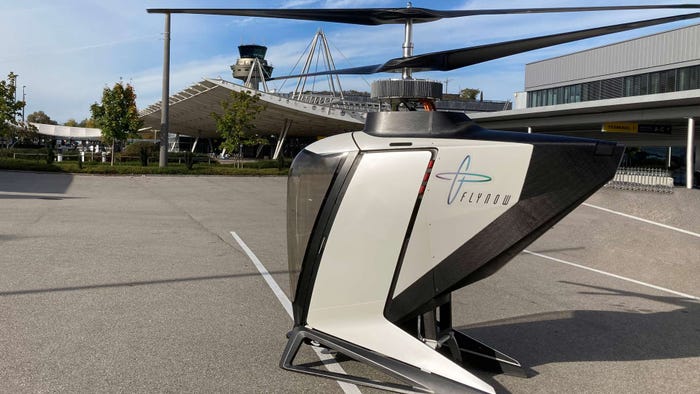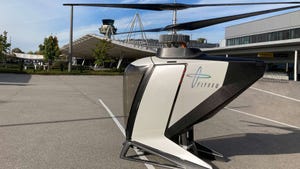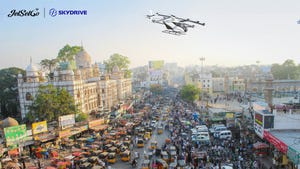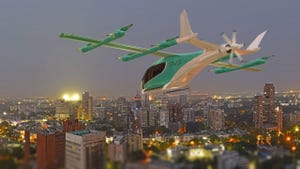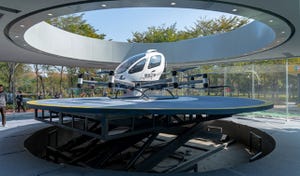Flying Car Company Taps AI for Vehicle DesignFlying Car Company Taps AI for Vehicle Design
SkyDrive partnered with Braid Technologies to use AI for thousands of design patterns to fine-tune its electric aerial vehicles
.jpg?width=1280&auto=webp&quality=95&format=jpg&disable=upscale)
Japanese eVTOL (electric vertical takeoff and landing) vehicle maker SkyDrive is turning to artificial intelligence (AI) to aid in the design of its flying vehicles.
SkyDrive partnered with Braid Technologies to use AI to generate thousands of design patterns to fine-tune the structure of its electric aerial vehicles (EAV).
Scientists, engineers and designers at startups Braid Technologies use AI, physics and mathematics to automatically discover high performance advanced engineering designs.
“We have been working with Braid to find new ways to optimize the structure of SkyDrive’s next-generation eVTOL,” said Arnaud Coville, chief development officer of SkyDrive. “Rather than using generalized techniques like topology optimization, we were inspired by their advanced and creative technology that deals with a large number of parameters that impact the weight of the structure.”
For more flying vehicle and other embedded tech news subscribe to our free newsletter!
SkyDrive was established in 2018 and conducted its first crewed flight test in Japan in 2019, so the project is to potentially enhance the vehicle, which is getting closer to deployment.
For example, SkyDrive and subway operator Osaka Metro recently signed an agreement to consider using eVTOL vehicles in the Osaka area.
SkyDrive and Osaka Metro are planning how to use EAVs in practical applications in Japan, including vertiport operations for takeoffs and landings.
Osaka Metro, which also invested in SkyDrive, operates eight subway lines and a driverless tram and carries more than 2 million passengers a day.
The subway operator was already integrating different subways, buses and taxis in the Osaka area and was selected as the operator of a vertiport outside the Expo site in Osaka.
The Federal Aviation Administration (FAA) recently accepted a type certification application from SkyDrive, submitted via Japan’s Civil Aviation Bureau (JCAB).
SkyDrive aims to obtain FAA type certification along with its expected JCAB type certification in 2026 or later.
SkyDrive also established a U.S. subsidiary in 2023 in preparation for its entry into the U.S. market, a critical market for all eVTOL makers.
The EAV maker formed a strategic alliance with Volatus Infrastructure and the two companies have been working on an advanced mobility infrastructure in South Carolina, the U.S. home base for SkyDrive. Volatus was recently acquired by eVertisky.
SkyDrive also agreed to sell five of its three-seat flying vehicles to a private charter service operator in Augusta, Georgia.
SkyDrive and Bravo Air also formed a partnership to develop use cases from Augusta Regional Airport to scale AAM in the region.
The Bravo Air deal expands SkyDrive beyond South Carolina and into Georgia.
For example, SkyDrive intends to establish an air taxi network connecting Augusta Regional Airport to destinations across the region.
SkyDrive has started production of its flying vehicle at a Suzuki manufacturing plant in Shizuoka, Japan.
The SkyDrive SD-05 vehicle, which SkyDrive refers to as a flying car, is being built by Sky Works, the SkyDrive manufacturing division, in partnership with Suzuki.
The Suzuki manufacturing plant has the capability to produce 100 of the three-seater EAVs per year.
SkyDrive recently agreed to sell its EAVs to an aerial tourism association in Japan and received a preorder for vehicles from the MASC General Incorporated Association, a group dedicated to promoting aerial tourism in Setouchi Islands in western Japan.
SkyDrive and MASC are working together to explore potential suburban routes for the SD-05 flying vehicle.
Other showrooms for EAVs are in preparation, such as those by Florida-based Aeroauto Global, which has two being readied in Florida and one being developed in Austin, Texas.
A showroom also has been opened in Germany by EAV developer Pal-V.
SkyDrive recently partnered with the Kansai Electric Power Company (KEPCO) to develop high-speed charging facilities for EAVs with the first station planned for this year.
Tokyo-based SkyDrive and KEPCO started working together in 2022 leading to the new joint development project.
SkyDrive last year received $82 million in a grant from the Japanese government, when the country’s Ministry of Economy, Trade and Industry selected SkyDrive for the Next Generation Air Mobility Field, part of an innovation promotion project.
SkyDrive’s stated vision is “to create a future where everyone has access to eVTOLs as their daily transportation in Japan and across the world.”
SkyDrive has a deal to sell up to 50 EAVs to Solyu in Korea, which is in the business of aircraft leasing and financing and aims to use EAVs to aid the severe traffic congestion there.
About the Author
You May Also Like


.jpg?width=700&auto=webp&quality=80&disable=upscale)
